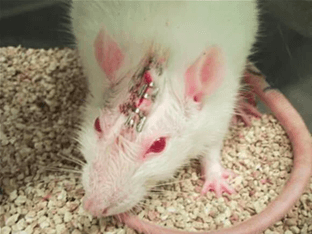PETA Challenges UNM HSC to Make Good on its Pledge to Reduce or Replace Animals in Experiments
For Immediate Release:
December 9, 2024
Contact:
Brandi Pharris 202-483-7382
The numbers of animals being experimented on is going up, not down, and they are enormous. Today, PETA threw down a gauntlet at the feet of the University of New Mexico Health Sciences Center (UNM HSC), challenging it to show proof that it is honoring its long, publicly-touted commitment to the “3Rs” principle of “replacing, reducing, and refining” the use of animals in experiments.
In a letter to university Interim Executive Vice President Michael Richards, PETA reveals that despite UNM HSC’s assurance to federal authorities that it would adhere to the 3Rs principle in its laboratories, the university used more than 9,000 mice and rats in experiments according to a recent inventory, as well as dozens of hamsters and rabbits, according to a 2023 federal report.

The 3Rs refer to reducing animal use, replacing animals with animal-free methods, and refining experiments on animals to be less cruel. The concept was first published in 1959 and, as a theory, was enthusiastically embraced by animal experimenters worldwide, but UNM HSC appears not to have put it into practice, as significant numbers of animals continue to be used in its laboratories. UNM HSC received over $73 million in taxpayer funding in 2023—and about half that money bankrolled experiments on animals. Among these, experimenters exposed 3-day-old mouse pups to alcohol vapors for four hours a day, supposedly to study the effects of alcohol exposure on brain development.
“For decades, the 3Rs principles of refine, reduce, and replace have been a convenient smokescreen for universities to hide behind—but their laboratories are prisons where sentient animals are deprived of a life, kept in metal boxes, and subjected to every foolish thing under the sun,” says PETA Vice President Dr. Alka Chandna. “We want Interim Executive Vice President Richards to come clean, and if there’s a real plan in place, make it public now or stop pretending.”
Studies show that 90 percent of basic research, most of which involves animals, fails to lead to effective treatments for humans, while 95 percent of new drugs that test safe and effective in animals later fail in humans. According to a poll published earlier this year, 80 to 85 percent of U.S. residents think experiments on animals should be phased out and tax dollars spent on non-animal methods instead. PETA is pushing universities to transition to superior, non-animal research methods.
PETA—whose motto reads, in part, that “animals are not ours to experiment on”—points out that Every Animal Is Someone and offers free Empathy Kits for people who need a lesson in kindness. For more information, please visit PETA.org or follow the group on X, Facebook, or Instagram.


